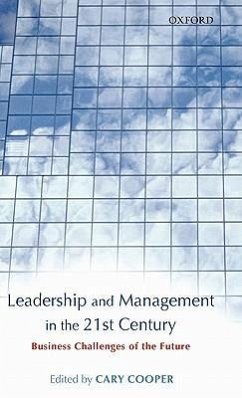What are the challenges facing the managers of today and tomorrow? In this book a number of distinguished management academics and pratitioners give their views. Scholars from leading business schools (e.g. Chris Argyris) and leading practitioners from industry (eg Sir Howard Davies), the public sector (eg Sir Michael Bichard), professional bodies (Geoff Armstrong, Director General of CIPD), the media (Hamish McRae of The Independent), reflect on where
organisations are going and what kind of leader manager will be needed in the changing world of work
Business has changed dramatically over the last two decades: Globalization, cross-national strategic alliances and mergers, privatizations, outsourcing, information technology innovations, and the increasing short term contract culture have all influenced this. In turn, the role of managers has had to adapt and change. The organizations they work in have changed in size and organizational structure. Their management style has had to adapt, as the workforce they
manage has become more dispersed and come to live in a state of permanent job insecurity. Moreover, the demands placed on managers by change seem a prerequisite, as business continues to develop as rapidly as ever.
This volume brings together the thoughts of leading figures from industry, academia, the public sector, professional bodies, and the media, to reflect on what the twenty-first century may mean for businesses and their leaders. The contributors examine what trends the mark the global economy in the twenty-first century, how this will affect businesses, and what will be required in terms of leadership and management to manage effectively? In doing so they cover such topics as leadership,
corporate culture, organizational structures, innovation, working life, and management education and the business school.
Hinweis: Dieser Artikel kann nur an eine deutsche Lieferadresse ausgeliefert werden.
organisations are going and what kind of leader manager will be needed in the changing world of work
Business has changed dramatically over the last two decades: Globalization, cross-national strategic alliances and mergers, privatizations, outsourcing, information technology innovations, and the increasing short term contract culture have all influenced this. In turn, the role of managers has had to adapt and change. The organizations they work in have changed in size and organizational structure. Their management style has had to adapt, as the workforce they
manage has become more dispersed and come to live in a state of permanent job insecurity. Moreover, the demands placed on managers by change seem a prerequisite, as business continues to develop as rapidly as ever.
This volume brings together the thoughts of leading figures from industry, academia, the public sector, professional bodies, and the media, to reflect on what the twenty-first century may mean for businesses and their leaders. The contributors examine what trends the mark the global economy in the twenty-first century, how this will affect businesses, and what will be required in terms of leadership and management to manage effectively? In doing so they cover such topics as leadership,
corporate culture, organizational structures, innovation, working life, and management education and the business school.
Hinweis: Dieser Artikel kann nur an eine deutsche Lieferadresse ausgeliefert werden.








